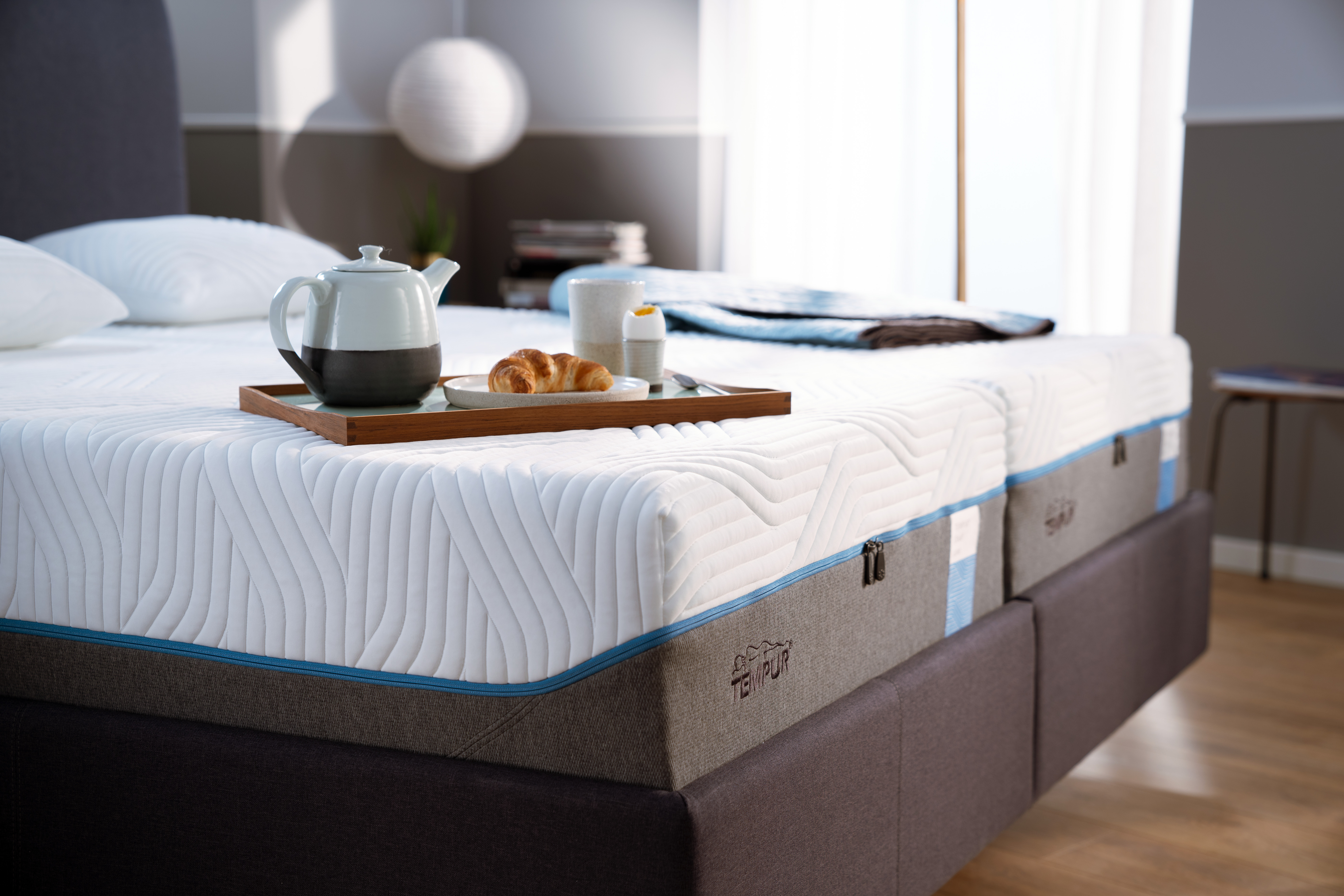Learn more about the science of sleep and wake up feeling refreshed with these 5 simple hacks
Regardless of where you live, what job you do, or what kind of food you eat, we all have one thing in common: we can’t live without sleep.

You likely know that the recommended amount of sleep for a healthy adult is around 8 hours a night. That being said, you perhaps didn’t know that not everybody’s natural sleep patterns are the same. Depending on our nocturnal habits, we all fall into one of four categories of sleeper: standard sleeper, night owl, early riser or difficult sleeper. Depending on which type of sleeper you are, you’ll need to practise certain habits to create a sleep schedule that works best for you.
Of course, there are myriad external factors that can impact our ability to sleep well – from work pressure to seemingly never ending to-do lists, and the general aches and pains of the human body. However, while some things that impact our sleep are totally out of our control (we're looking at you, restless children), what isn't is our ability to practise good sleep hygiene. That is, habits that promise to boost our shut-eye.
Sleep will never stop being important. Several studies have found it to be one of the most important factors in a healthy lifestyle, so investing time and care into your sleep ritual promises to significantly boost your energy levels and mental health, too.
For five science-backed tips for catering to your sleeper type and improving your habits all round, keep scrolling. Be sure to take our quiz to help find out what type of sleeper you really are.
1. Stick to a strict sleep cycle
The first habit for improving your sleep quality is simple enough: aim to go to bed and wake up at the same time each day. Why? Well, because having set wake-up and wind-down times helps set in motion a pattern that allows your body to gradually prepare for sleep throughout the day. Regardless of whether you’re a night owl or an early riser, this sleep tip is crucial.
Top tip: If you decide to head to bed around 10pm but you’re a difficult sleeper, try to resist the temptation to scroll through social media. That’s because the blue light from your phone screen can trick your body into thinking it's daytime, making it less likely to continue releasing the all-important sleep hormone melatonin.
Instead, try this: charge your phone in another room, or if that's not an option for you and you do find yourself scrolling, create a sleep-friendly zone within your bedroom where you can read or listen to soothing music. You'll likely feel tired in no time. Repeat this routine as and when you need it, but ensure you keep going to bed and waking up at the same time for optimum sleep quality.
2. Eat for a successful sleep

Listen up, difficult sleepers, because this next hack could quickly enhance your sleep quality. When it comes to getting a decent night’s sleep, caffeine won't set you up best for a relaxing bedtime. Studies have found it can delay the timing of your body clock and impact your amount of deep sleep, too.
The typically recommended cut-off time for caffeine consumption is around eight hours before bedtime – so 2pm, if you're aiming to get to sleep around 10pm. It's important to note that fizzy drinks often contain caffeine, too. It's not just coffee that gives you a buzz.
Going to bed with a full stomach can also impact your ability to drift off, as digesting the food can keep you awake. Consider eating dinner at least three hours before bedtime to give your body the chance to fully digest your food before putting your head to the pillow. If you’re a night owl, you may be tempted to eat late into the evening, but try and abstain!
Finally, be mindful of the fact that alcohol can also impact your sleep quality. Although red wine, for example, may make you feel sleepy at first, studies have found it can disrupt sleep quality overall. While drinking in moderation shouldn't cause issues, Sleep Foundation reports that excessive alcohol consumption can disrupt sleep quality by up to 39.2%.
3. Get moving
According to the World Health Organization, when it comes to exercise we should be aiming to do at least 150 minutes moderate-intensity or 75 minutes vigorous-intensity aerobic physical activity per week.
Why is this important for our shut-eye? Well, regular exercise lends itself to better sleep as it's been found to improve the symptoms of insomnia and increase the amount of time you spend in a deep sleep. If you fall into the difficult sleeper category, doing a few extra steps every day could massively improve your sleep pattern.
Do note here: it’s important to be patient with working out and improving sleep quality. Even for the standard sleeper it can take a few months of regular exercise before your body will reap the sleep-boosting benefits. During the initial stages, concentrate on creating an exercise routine that you really enjoy and can do consistently – whatever that looks like for you.
4. Set the mood

Want a simple step in getting your body and mind prepped for good quality sleep? Create an easy and relaxing bedtime routine.
As above, activities that take you away from other stimulants like your phone or the TV work a treat here – think reading, listening to calming music, journaling or meditating. The idea here is to help your body unwind so it can prepare for a night of rest, so aim to keep screens out of the equation, where possible.
For early risers, this might mean steering clear of temptations in your home that will keep you awake. For instance, being tempted to stay up with your partner or flatmates watching a film. Having your own personal bedtime routine is key for signalling to your body that it’s time to rest. Plus, it's a great way to factor in some me-time and properly unwind after a busy day.
5. Kit your bed out right
A final key factor in getting a good night's sleep is your bed set-up. It's far easier to get some high-quality shut-eye on a bed that offers comfort and support than one that prods you with pesky springs when you roll over.
It’s important to have both a memory foam mattress and pillow that evenly distribute weight and pressure to guarantee a comfortable sleep. If you’re in the market for either of these, then check out what TEMPUR® has to offer. The only mattress company in the world to be certified by the International Space Foundation, all TEMPUR® Material derives from NASA technology, which means its products are made from a viscoelastic material more effective than memory foam in providing pressure relief.
Click the link to find out more about TEMPUR®'s range of mattresses, pillows and bed bases. Not sure what type of sleeper you are? Take our quiz first to find out and see tips tailored to your needs.
Celebrity news, beauty, fashion advice, and fascinating features, delivered straight to your inbox!
The leading destination for fashion, beauty, shopping and finger-on-the-pulse views on the latest issues. Marie Claire's travel content helps you delight in discovering new destinations around the globe, offering a unique – and sometimes unchartered – travel experience. From new hotel openings to the destinations tipped to take over our travel calendars, this iconic name has it covered.
-
 The 13 Books I Cannot Wait To Read This Year
The 13 Books I Cannot Wait To Read This YearBookmark this for your 2026 reading list
-
 Big Skirt Energy: Why Statement Skirts Will Be The Defining Fashion Item of 2026
Big Skirt Energy: Why Statement Skirts Will Be The Defining Fashion Item of 2026If you only invest in one piece of clothing this year, make it this
-
 Is a Suede Trench Coat the Chicest Solution to Cold-Weather Dressing? The Fashion Set Thinks So
Is a Suede Trench Coat the Chicest Solution to Cold-Weather Dressing? The Fashion Set Thinks SoIt may be time to pack the wool coats away